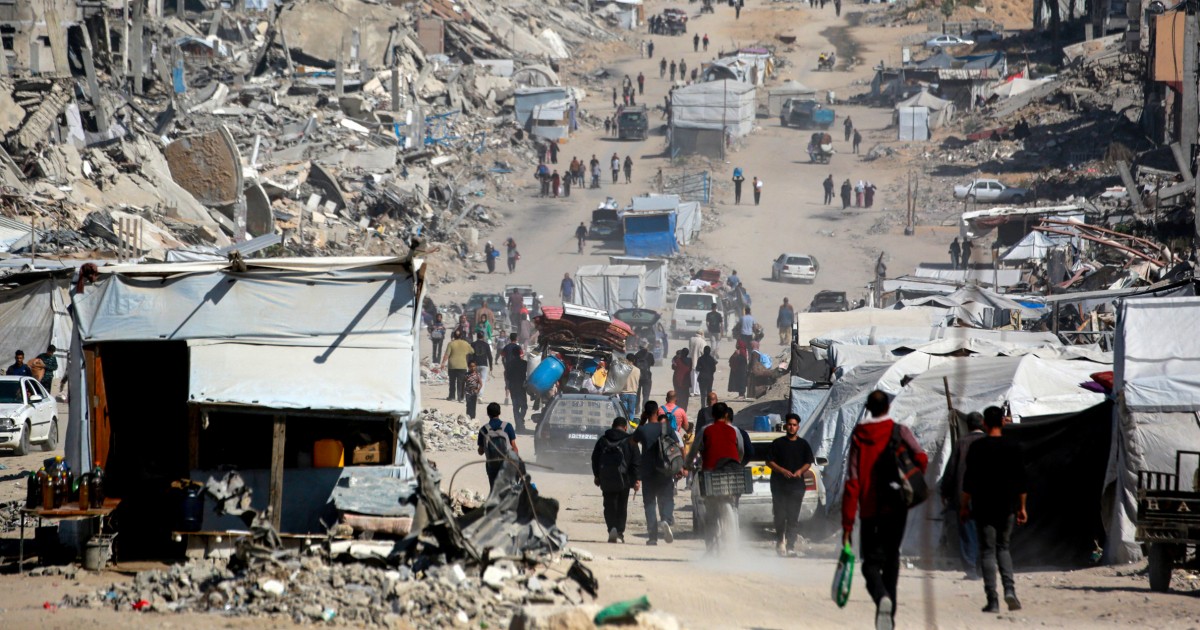Trump Administration Proposes Controversial Plan to Relocate Palestinians to Libya










2025-05-16T20:04:01Z

Amid ongoing tensions in the Middle East, the Trump administration is reportedly devising a plan to permanently relocate up to 1 million Palestinians from the Gaza Strip to Libya, according to five individuals privy to the discussions, as reported by NBC News.
Sources indicate that the administration is taking the proposal seriously enough to have engaged in discussions with Libyan leadership, including representatives from both sides of the country's political divide. These discussions involve not only the logistics of such a monumental relocation but also the potential for the U.S. to release billions of dollars in funds that have been frozen for over a decade as part of the deal to facilitate the resettlement.
While no formal agreement has been finalized, the Israeli government has been kept in the loop regarding the ongoing discussions, according to these same sources. The U.S. State Department and the National Security Council, however, have not provided any official comment on the matter despite several requests. After initial reports emerged, a spokesperson for the State Department categorically denied the existence of any such plans, stating, “these reports are untrue.” They elaborated that “the situation on the ground is untenable for such a plan. Such a plan was not discussed and makes no sense.”
In response to these developments, Basem Naim, a senior official with Hamas, the governing entity in Gaza that has been designated as a terrorist organization by the U.S., expressed disbelief regarding the discussions about relocating Palestinians. Naim emphasized the deep-rooted connection Palestinians have to their homeland, stating, “Palestinians are very rooted in their homeland, very strongly committed to the homeland and they are ready to fight up to the end and to sacrifice anything to defend their land, their homeland, their families, and the future of their children.” He further asserted that the decision regarding their fate belongs solely to the Palestinians themselves.
Adding another layer of complexity, Libya is currently grappling with significant instability stemming from nearly 14 years of civil strife following the fall of long-time dictator Moammar Gadhafi. The country is now divided between two rival governments: one led by Abdul Hamid Dbeibah in the west and the other by Khalifa Haftar in the east. The ongoing conflict has resulted in a dire humanitarian situation, with Libya struggling to provide for its existing population of approximately 7.36 million people. The State Department has advised American citizens against traveling to Libya due to rampant crime, terrorism, and civil unrest.
While details surrounding the potential relocation of Palestinians remain vague, there are indications that the Trump administration has considered financial incentives to encourage Palestinians to relocate. This could involve provisions such as housing, financial stipends, or other support to ease the transition.
However, the feasibility of relocating such a vast number of people poses monumental logistical challenges. Moving up to 1 million Palestinians from Gaza to Libya would be akin to the U.S. absorbing approximately 46 million people in terms of population density. Complicating matters, Gaza currently lacks an operational international airport, requiring that any evacuees first be transported to nearby facilities, such as the airport in Cairo, located about 200 miles away. This transport logistics would require careful planning and significant resources.
Alternative transportation methods, including land routes through Egypt or potential sea transit, have also been discussed. For instance, transporting people by bus from Gaza to Libyan cities like Benghazi would cover roughly 1,300 miles, a considerable challenge given the limited capacity of vehicles.
Trump’s broader vision for postwar Gaza includes transforming the region into what he described as “the Riviera of the Middle East.” He indicated in earlier statements that Palestinians must be located elsewhere for such a reconstruction effort to be successful, emphasizing the need for safety and security for the people relocating. “You can’t live in Gaza right now, and I think we need another location,” he asserted during a meeting with Israeli Prime Minister Benjamin Netanyahu.
Despite Trump’s intentions, his plan has drawn skepticism and criticism from various factions, including some lawmakers and Arab leaders, who have raised concerns regarding the ramifications of such a move. In recent months, the U.S. administration has also rebuffed proposals from Egypt that suggested rebuilding Gaza without displacing its inhabitants.
As the situation unfolds, the Trump administration continues to explore various locations for the potential resettlement of Palestinians, with Syria being mentioned as another possibility following its recent leadership changes. Moving forward, it remains unclear how this contentious plan will develop and what impact it will have on both the Palestinians and the broader geopolitical landscape of the Middle East.
 Erik Nilsson
Erik Nilsson
Source of the news: NBC News